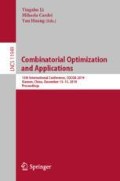Abstract
A seller has an items set \(M=\left\{ 1,2,\dots ,m\right\} \) and the amount of each item is 1. In the buyer set \(N=\{1, 2, ..., n\}\), each buyer i has an interested bundle \(B_i\subseteq M\), a valuation \(v_i\) on \(B_i\), and a set of budgets \(e_{ij}\) on each item j. The seller knows the whole information of the buyers and decides the price for each item so as to maximize the social welfare. Buyers come in an arbitrary order. When a buyer comes, each item can be only sold integrally. In previous works, if a buyer’s interested bundle does not exist, he will buy nothing and cannot be satisfied. In this paper, we consider the buyer can be partially satisfied. If some items in \(B_i\) are sold out on the arrival of buyer i, he might be partially satisfied by buying a subset of \(B_i\) without violating the budget condition. We first show that in this new model, achieving the maximum social welfare is NP-hard. Moreover, an optimal assignment oracle can be used to achieve the maximum social welfare. We then analyze two pricing schemes to approximate the optimal social welfare. In the trade-off pricing scheme, an O(k)-approximation algorithm can be achieved if considering the subset of the bundle, where k is the maximal cardinality of the assigned bundle among all buyers. In the item-set pricing scheme, when \(d=\dfrac{1}{2}|x_{iB}^*|\), the social welfare can be approximated within the factor 2, moreover, compared with the traditional (non-partial assignment) setting, the social welfare can be increased by at least \(\sum _{S_{i}}\dfrac{d}{\left| x_{iB}^*\right| }\sum _{j\in S_{i}}e_{ij}^{'}\), where \(S_i\) is the buyer subset containing item j, \(x_{iB}^*\) represents the ith optimal assignment subset’s complete set, i.e, if the optimal assignment item set is one buyer bundle \(B_{i}\)’s subset, then \(x_{iB}^*=B_{i}\), \(x_{iB}\) is the intersection of \(B_{i}\) and the optimal assignment item set S, d is the minimum of \(\left| x_{iB}\right| \) and \(\left| x_{iB}^*\right| -\left| x_{iB}\right| \), and \(e_{ij}^{'}\) is the optimal assignment item’s budget.
Access this chapter
Tax calculation will be finalised at checkout
Purchases are for personal use only
References
Azar, Y., Cohen, I.R., Roytman, A.: Online lower bounds via duality. In: Proceedings of SODA 2017, pp. 1038–1050 (2017)
Babaioff, M., Immorlica, N., Lucier, B., Weinberg, S.M.: A simple and approximately optimal mechanism for an additive buyer. In: Proceedings of FOCS 2014, pp. 21–30 (2014)
Bei, X., Gravin, N., Lu, P., Tang, Z.G.: Correlation-robust analysis of single item auction. In: Proceedings of SODA 2019, pp. 193–208 (2019)
Cai, Y., Zhao, M.: Simple mechanisms for subadditive buyers via duality. In: Proceedings of STOC 2017, pp. 170–183 (2017)
Chawla, S., Hartline, J., Kleinberg, R.: Algorithmic pricing via virtual valuations. In: Proceedings of EC 2007, pp. 243–251 (2007)
Chawla, S., Miller, J.B., Teng, Y.: Pricing for online resource allocation: intervals and paths. In: Proceedings of SODA 2019, pp. 1962–1981 (2019)
Cheung, M., Swamy, C.: Approximation algorithms for single-minded envy-free profit-maximization problems with limited supply. In: Proceedings of FOCS 2008, pp. 35–44 (2008)
Chin, F.Y.L., Poon, S.-H., Ting, H.-F., Xu, D., Yu, D., Zhang, Y.: Approximation and competitive algorithms for single-minded selling problem. In: Tang, S., Du, D.-Z., Woodruff, D., Butenko, S. (eds.) AAIM 2018. LNCS, vol. 11343, pp. 98–110. Springer, Cham (2018). https://doi.org/10.1007/978-3-030-04618-7_9
Dütting, P., Feldman, M., Kesselheim, T., Lucier, B.: Prophet inequalities made easy: stochastic optimization by pricing non-stochastic inputs. In: Proceedings of FOCS 2017, pp. 540–551 (2017)
Feldman, M., Gravin, N., Lucier, B.: Combinatorial auctions via posted prices. In: Proceedings of SODA 2015, pp. 123–135 (2015)
Jin, Y., Pinyan, L., Tang, Z.G., Xiao, T.: Tight revenue gaps among simple mechanisms. In: Proceedings of SODA 2019, pp. 209–228 (2019)
Karp, R.M.: Reducibility among combinatorial problems. In: Miller, R.E., Thatcher, J.W., Bohlinger, J.D. (eds.) Complexity of Computer Computations. IRSS, pp. 85–103. Springer, Boston (1972). https://doi.org/10.1007/978-1-4684-2001-2_9
Zhang, Y., Chin, F.Y., Ting, H.-F.: Online pricing for bundles of multiple items. J. Global Optim. 58(2), 377–387 (2014)
Acknowledgements
This research is supported by China’s NSFC grants (No. 61433012), Hong Kong GRF-17208019, Shenzhen research grant (No. KQJSCX20180330170311901, JCYJ 20180305180840138 and GGFW2017073114031767), Shenzhen Discipline Construction Project for Urban Computing and Data Intelligence.
Author information
Authors and Affiliations
Corresponding author
Editor information
Editors and Affiliations
Rights and permissions
Copyright information
© 2019 Springer Nature Switzerland AG
About this paper
Cite this paper
Gao, G., Ning, L., Ting, HF., Zhang, Y., Zou, Y. (2019). Algorithmic Pricing for the Partial Assignment. In: Li, Y., Cardei, M., Huang, Y. (eds) Combinatorial Optimization and Applications. COCOA 2019. Lecture Notes in Computer Science(), vol 11949. Springer, Cham. https://doi.org/10.1007/978-3-030-36412-0_17
Download citation
DOI: https://doi.org/10.1007/978-3-030-36412-0_17
Published:
Publisher Name: Springer, Cham
Print ISBN: 978-3-030-36411-3
Online ISBN: 978-3-030-36412-0
eBook Packages: Computer ScienceComputer Science (R0)

